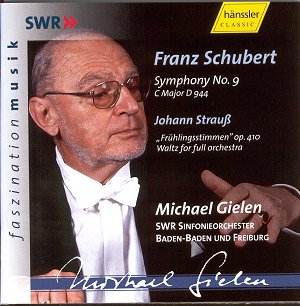This is a tribute disc to mark the 75th
birthday of the conductor Michael Gielen. German-born, he spent formative
years in Buenos Aires, which was no bad place to be for a young budding
conductor (despite the tragic circumstances of being a member of a Jewish
family fleeing from Nazi persecution). Both Fritz Busch and Erich Kleiber
were resident in the city.
Gielen has made his name as a conductor of contemporary
works, and having played Schoenberg’s complete piano works to the composer
on his 75th birthday he certainly had a thorough schooling.
He has spent years as GMD (General Music Director) of various top rank
opera houses (Frankfurt, Stockholm, Amsterdam) and has led orchestras
in Europe and America, as well as becoming a pedagogue of conducting
at various European centres. His association with the SWF Radio Orchestra
goes back to 1986, and since 1999 it is described as ‘Permanent Guest
Conductor’.
Before getting to the interpretations of both works
on this CD, mention must be made of the appalling incoherence of the
booklet. Record companies really do have to get their act together and
ensure such travesties as this do not find their way into their booklets.
It does them no credit, nor I imagine would Gielen or his English agent
approve. Here are a couple of extracts of this gobbledegook:
His years in Baden-Baden began in 1986 to lead
(and are still leading) all around to that which had long been Michael
Gielen’s wish - archived (and commercially available) tapes and
CD’s which are able extensively to document his view of the
works of music history from Johann Sebastian Bach to George Lopez
- and which a symphony orchestra such as that of the Südwest(rund)funk
could but wish for - which record concerts at home and on tour whose
"publica" often announce with their unremitting applause
at the outset what they do not expect, namely, any trace of the
boring or the commonplace.
…It would appear that even the uninitiated now
know what Gielen stands for, what he does, who he is: an "outsider"
(honored with the "Cannes Classical Lifetime Achievement Award
2002", following the Adorno Prize, the Great Federal Service
Cross, honorary doctorate …) who has allied himself with the outsider
quality of the art works in order steadfastly to help them win the
recognition which is their due.
More coherent and pertinent are Gielen’s own comments
on Schubert in general and the ‘Great’ C major symphony in particular,
so maybe he should have written his own curriculum vitae for the booklet.
He was brought up on Furtwängler’s (slow) interpretation but was
taken to task by his teacher Josef Polnauer, a Viennese, who pointed
out that the opening theme is a ‘walking theme’ (Andante) and Schubert’s
original marking has turned out to be 2/2 rather than 4/4, in other
words twice the ‘traditional’ speed (Norrington has recorded it thus).
It makes perfect sense, for it also explains why it has always been
traditional and necessary for this ‘problematic’ introduction to accelerate
into the Allegro. However by taking it from the outset at double the
speed we are used to hearing it proves unnecessary to make any change
of tempo, the result a wonderfully seamless progression. Gielen, in
his own words, points out that the ‘walking theme’ must be seen as ‘relatively
young people in Vienna at the time, so keen on marching from wine garden
to wine garden, tasting the new vintage wine’, a wonderful image.
Strauss’s waltz for full orchestra makes an enjoyable
and joyous filler and Gielen’s clearly Viennese origins explore a freedom
of tempo and rubato to achieve a warm-blooded performance. Throughout
the disc the orchestra plays well for him despite some hard-edged timbres
in its full sound, for instance at the opening of the finale of the
symphony. All in all it did not quite bring tears to my ears (Gielen
confesses as much in his essay on Schubert’s music) but he does make
some interesting musical points.
Christopher Fifield


